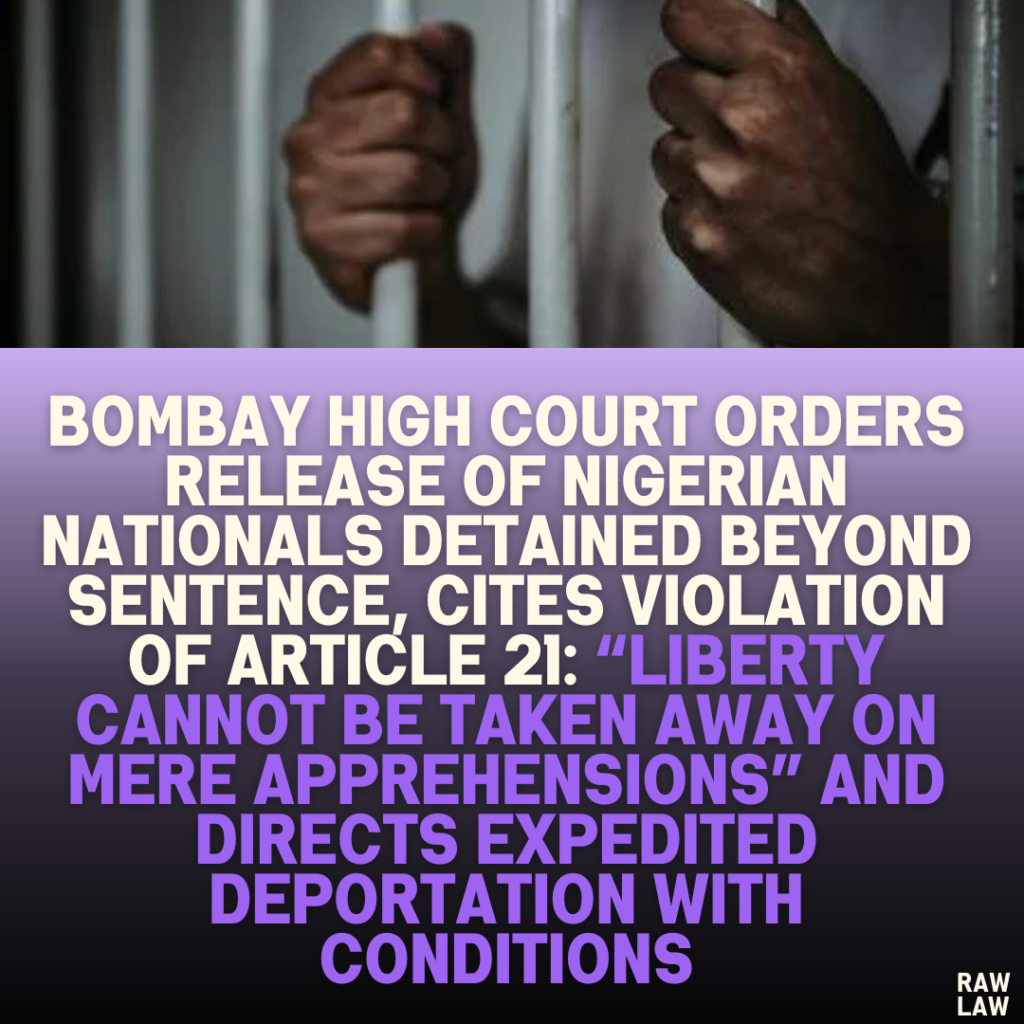Court’s Decision:
The Bombay High Court directed the release of two Nigerian nationals who had been detained by the Anti-Narcotics Cell (ANC) beyond their completed sentences. The court emphasized that detention beyond the lawful sentence contravenes Article 21 of the Constitution of India, which guarantees the right to life and liberty. The court remarked, “Liberty of a person, which is most inviolable, cannot be taken away on mere apprehensions.”
The court allowed the petitioners to remain free with specific conditions to ensure their availability for deportation, including weekly reporting to the ANC and restrictions on leaving Mumbai.
Facts:
- On January 12, 2019, a case was registered against the petitioners under Sections 8(c), 21(c), and 29 of the Narcotics Drugs and Psychotropic Substances Act (NDPS Act), 1985. They were also charged under Sections 465, 468, and 471 of the Indian Penal Code (IPC); Sections 14-A and 14-B of the Foreigners Act, 1946; and Section 12(1-A)(b) of the Passport Act, 1967.
- The charges arose from the seizure of 1.005 kg of cocaine.
- The petitioners were tried before the Sessions Court in Mumbai, which on November 11, 2024, acquitted them under the NDPS Act but convicted them under other provisions. They were sentenced to:
- Two years rigorous imprisonment under Section 465 of the IPC.
- Five years and six months rigorous imprisonment and a fine under Sections 468 and 471 of the IPC.
- Similar sentences under the Foreigners Act and Passport Act.
- The sentences were ordered to run concurrently, with the benefit of set-off under Section 428 of the Criminal Procedure Code (CrPC).
- Upon completing their sentence, the Sessions Court directed their deportation as they were illegally residing in India.
- Despite serving their sentences, the petitioners were detained by the ANC pending deportation.
Issues:
- Whether the continued detention of the petitioners by the ANC after completing their sentence is lawful.
- Whether restrictions imposed under the Foreigners Order, 1948, justified their detention.
Petitioner’s Arguments:
- The petitioners argued that their detention violated their fundamental rights under Articles 20, 21, and 22 of the Constitution.
- They had already completed their sentences, and any further detention was unlawful.
- They were eager to return to their home country and were not absconding or engaging in illegal activities.
- Their detention in the ANC premises amounted to abuse of power.
Respondent’s Arguments:
- The respondents claimed that restrictions under the Foreigners Order, 1948, were necessary to prevent the petitioners from absconding or engaging in illegal activities while awaiting deportation.
- The ANC Bandra Unit provided them with accommodation due to the non-availability of a functional detention center.
Analysis of the Law:
- Fundamental Rights of Foreign Nationals: Article 21 of the Constitution guarantees the right to life and liberty to all persons, including foreign nationals. Continued detention after serving a sentence violates this right unless justified by exceptional circumstances, such as posing a security threat.
- Foreigners Order, 1948: The order empowers the Civil Authority to impose restrictions on foreign nationals for deportation-related processes. However, such restrictions must not exceed what is reasonable and necessary.
- Proportionality Principle: Restrictions must be proportionate to the threat posed. In this case, the court found no evidence that the petitioners posed a threat to national security or were likely to abscond.
Precedent Analysis:
The court relied on Ana Paraveen v. Union of India, where the Supreme Court held that detention beyond the sentence period, without security or national interest concerns, violates Article 21. In that case, the court permitted the release of the detainee, subject to furnishing a personal bond and sureties.
Court’s Reasoning:
- Unlawful Detention: The court noted that the petitioners had served their sentences and there were no pending cases or security threats attributed to them. Their continued detention in the ANC premises violated Article 21.
- Administrative Delays: Procedural delays in deportation cannot justify prolonged detention. The court remarked, “Liberty cannot be taken away on mere apprehensions.”
- Violation of Constitutional Rights: The court held that the restrictions imposed under the Foreigners Order, 1948, were disproportionate and lacked legal justification.
Conclusion:
The court ordered the petitioners’ immediate release with the following conditions to facilitate their deportation:
- The petitioners must report weekly to the ANC Bandra Unit.
- They shall not leave Mumbai without prior permission from the authorities.
- The petitioners must furnish their residential address and contact details, subject to verification.
The court also directed the authorities to expedite the deportation process.
Implications:
This judgment reinforces the protection of fundamental rights, even for foreign nationals, emphasizing that administrative delays cannot justify the infringement of liberty. It highlights the judiciary’s role in upholding constitutional values and ensuring that executive actions are lawful and proportionate.
